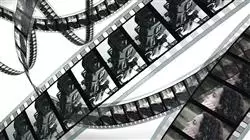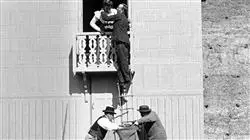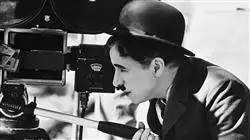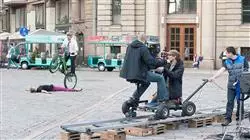University certificate
The world's largest faculty of journalism and communication”
Why study at TECH?
Join us and broaden your knowledge in History of Film and Television"

The cinematographic narration and its evolution until it became an industry, the irruption of sound films, the classic style, the new perspectives since the 60's and the present are just some of the facets that scriptwriters must have in their knowledge, because only if they take into account what has already been done can they improve and innovate.
Knowing the origins of silent and sound-containing films, their main promoters; and going into the films used as propaganda during the Second World War will be one of the main sections.
Scriptwriters will be able to specialize in the documentary genre with the help of the main storytellers in this field. As for television, one of the most popular genres, the Postgraduate certificate delves into television scripts, streaming platforms, 19th century series and American fiction, among others.
This program is the most complete in the market and is aimed at introducing professionals to the history of film and television, which will allow them to reach a higher level of performance, based on the fundamentals and the latest trends in the development of audiovisual scriptwriting. Take advantage of the opportunity and take this program in a 100% online format, which will allow you to continue growing in your career as screenwriter without leaving aside the rest of your responsibilities.
This program will allow you to enhance your skills and become an expert scriptwriter in History of Film and Television"
This ##ESTUDIO## in History of Film and Television contains the most complete and up-to-date educational program on the market. The most important features include:
- The development of practical cases presented by experts in the history of films and television
- The graphic, schematic, and practical contents with which they are created provide scientific and practical information on the disciplines that are essential for professional practice
- Practical exercises where the self-assessment process can be carried out to improve learning
- Algorithm-based interactive learning system for decision-making on the situations raised in the history of films and the television
Theoretical lessons, questions to the expert, debate forums on controversial topics, and individual reflection assignments - Content that is accessible from any fixed or portable device with an Internet connection
Work with the best scriptwriters and teaching professionals in this Postgraduate certificate with curricular value of excellence"
The teaching staff includes professionals from the field of audiovisual scripts, who bring their work experience to this educational program, as well as renowned specialists from leading societies and prestigious universities.
The multimedia content, developed with the latest educational technology, will provide the professional with situated and contextual learning, i.e., a simulated environment that will provide immersive education programmed to learn in real situations.
This program is designed around Problem-Based Learning, whereby students must try to solve the different professional practice situations that arise during the academic year. For this purpose, the students will be assisted by an innovative interactive video system created by renowned and experienced experts in History of Film and Television.
Don't miss the opportunity to enhance your knowledge in History of Film and Television"

Learn about the latest trends in the entertainment industry and update your knowledge in scriptwriting"
Syllabus
The structure of the contents has been designed by a team of professionals in Audiovisual Screenwriting for audiovisual media, who are aware of the importance of up-to-date professional development in order to be able to delve into the field of knowledge, through the use of the available tools.

This Postgraduate certificate contains the most complete and up-to-date program on the academic market”
Module 1. Television and Film History
1.1. Origins of Film
1.1.1. Exhibit
1.1.1.1. Lumière, 1895
1.1.1.2. Méliès
1.1.2. Tell the Story
1.1.2.1. Alice Guy
1.1.2.2. Edwin S. Porter
1.1.3. Compose
1.1.3.1. David W. Griffith
1.1.4. From Motion Exposure to Plot Narrative
1.2. Film Industry
1.2.1. Irruption of Sound
1.2.2. Screenwriters and Directors
1.2.3. Silent or Audible?
1.2.3.1. From 1929 to 1939
1.2.4. Hollywood
1.2.4.1. Classical Style from 1940 to 1960
1.2.5. The 1960s
1.2.5.1. Tradition
1.2.5.2. New Perspective
1.2.6. From the 1980s to today
1.2.6.1. Global Consumption
1.2.6.2. Seventh Art
1.3. Film and Propaganda During the Second World War
1.3.1. Nazi Propaganda
1.3.1.1. Leni Riefenstahl
1.3.1.1.1. The Esthetics of Triumph
1.3.2. United States Propaganda
1.3.2.1. Army Didactic Propaganda
1.3.3. Film and History
1.3.3.1. Historical Film
1.3.3.1.1. Documentaries
1.3.3.1.2. Fiction
1.3.3.2. Television History
1.3.3.2.1. Images
1.3.3.2.2. Words
1.4. Documentary Genre
1.4.1. Origin
1.4.1.1. Ethnographic Documentary
1.4.1.1.1. Flaherty
1.4.1.2. Social Documentary
1.4.1.2.1. Grierson
1.4.1.2.2. Ivens
1.4.1.3. Exploring the World
1.4.1.3.1. Upcoming
1.4.1.3.2. Remote
1.4.1.4. Fundamentals
1.4.1.4.1. Esthetics
1.4.1.4.2. Ethics
1.5. Documentary Genre II
1.5.1. Direct Films
1.5.1.1. Innovations in Film
1.5.1.2. Narrating with Reality
1.5.1.2.1. Frederick Wiseman
1.5.1.3. Rise of Documentary Films
1.5.1.3.1. The 1970s
1.5.1.3.2. New Narrative Strategies
1.5.1.3.2.1. Michael Moore
1.5.1.3.3. 20th century
1.5.1.3.4. Legacy
1.5.1.3.5. Advances
1.6. Television
1.6.1. Script
1.6.1.1. Televised
1.6.1.2. Video Streaming Platforms
1.6.1.3. Visual Novels
1.6.1.4. Traditional Television Term
1.6.1.5. Renewed Television Boom
1.6.1.5.1. North America
1.6.1.6. Series in the 19th Century
1.7. Television II
1.7.1. North American Fiction
1.7.1.1. Foundational Stage
1.7.1.1.1. Single Play
1.7.1.1.2. Western
1.7.1.1.3. Action
1.8. Television III
1.8.1. North American Fiction
1.8.1.1. Evolution in Genres
1.8.1.1.1. Police
1.8.1.1.2. Science Fiction
1.8.1.1.3. Comedy
1.8.1.1.4. Professional Drama
1.9. Television IV
1.9.1. North American Fiction
1.9.1.1. Evolution and Boom
1.9.1.1.1. Mini-Series
1.9.1.1.2. Infant and Juvenile
1.9.1.1.3. Adult Animation
1.9.1.1.4. Soap Operas
1.9.2. Latin American Fiction
1.9.2.1. Predominance of Soap Operas
1.10. Narrative in Current Films
1.10.1. Modular Narratives
1.10.1.1. Anachronistic
1.10.1.2. Crosslinks
1.10.1.3. Gamification

A unique, key, and decisive educational experience to boost your professional development”
Postgraduate Certificate in History of Film and Television
If you want to excel in the creation of innovative audiovisual products, it is essential to know its history. Therefore, delving into the origins of cinema and the authorships that marked milestones in its initial development or examining the history of television stands as an indispensable factor. In fact, you have the opportunity to make this exciting historical journey thanks to this Postgraduate Certificate in History of Film and Television, which will add enormous value to your curriculum.
Delve into the propaganda in cinema during the Second World War
Through this Postgraduate Certificate in History of Film and Television, you will be able to analyze in detail the origins of silent and sound films and their main promoters. But you will also delve into the cinema through the propaganda used during the Second War. Undoubtedly, this is a very complete academic opportunity that you will be able to take from anywhere. At the same time, you will benefit from the valuable experience of true eminences in this field who will provide you with all the keys you need.







